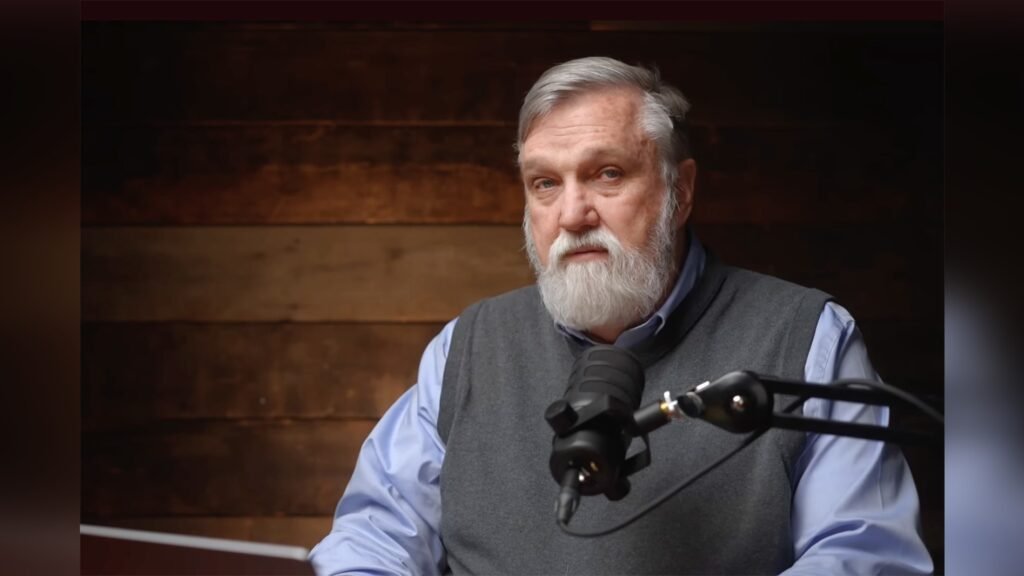Doug Wilson: Advocate for a Christian Theocracy in Trump’s DC

Introduction to Doug Wilson
Doug Wilson is a prominent theologian, author, and pastor known for his influential role in the Christian conservative movement. Born in 1953, he has dedicated much of his life to the intersections of faith, culture, and politics, with a particular focus on advocating for a theocratic vision grounded in Christian principles. Wilson earned his Bachelor of Arts degree from the University of Idaho, which laid the foundation for his later theological pursuits and writings.
A significant aspect of Doug Wilson’s influence derives from his affiliation with the Reformed tradition, specifically his connection to the Presbyterian Church in America (PCA) and the creation of a new denomination known as the Communion of Reformed Evangelical Churches (CREC). Throughout his pastoral career, Wilson has established a reputation as a compelling speaker and an articulate proponent of a worldview that seeks to align the governance of society with biblical doctrines. His teachings often emphasize the application of Christian principles to all areas of life, including politics, education, and family, which is a recurring theme in his many publications.
As a prolific writer, Doug Wilson has authored numerous books that delve into topics such as Christianity, culture, and politics. Works like “Reconstruction Theology” and “The Federal Vision” highlight his theological perspective and underscore his commitment to a vision of society that privileges Christian governance. His ideas, including the belief in a Christian theocracy, have gained traction among certain factions of the New Right during Donald Trump’s presidency, serving as a catalyst for discussions around the role of faith in politics. Through his writings and various platforms, Wilson continues to shape the dialogue surrounding the integration of religion in the public sphere, positioning himself as a key figure in contemporary conservative thought.
Understanding Christian Theocracy
Christian theocracy is a governance model where the state is directly influenced or led by religious leaders, and laws are founded upon Christian doctrine. In this system, the authority of the government is seen as derived from divine will, with the objective of promoting and enforcing Christian values within the public sphere. Advocates argue that such a framework can lead to a society that is morally aligned and promotes a common good based on biblical principles. However, this structure significantly contrasts with secular governance, where the separation of church and state is upheld, ensuring that laws and policies are formulated based on democratic principles and empirical reasoning rather than religious doctrine.
In the vision articulated by figures like Doug Wilson, a Christian theocracy would integrate Christian principles into all aspects of societal governance. This includes not just the legal system, but also the cultural and educational spheres. Supporters believe that laws reflecting biblical precepts would lead to an increase in moral behavior and civic responsibility among citizens. For instance, issues such as family values, marriage, and even business ethics could be influenced directly by Christian teachings, ultimately fostering a community that adheres to what they perceive as divinely ordained conduct.
However, the implications of establishing a theocratic system raise significant questions regarding religious freedom and pluralism. Critics contend that incorporating specific religious beliefs into public law may marginalize those who do not subscribe to those beliefs, disrupting social cohesion in a diverse society. Furthermore, the role of religious institutions in governance can blur the lines between faith and politics, leading to a potential infringement on individual liberties and freedoms. As such, the discourse surrounding Christian theocracy necessitates a thorough examination of both its ideological underpinnings and practical ramifications in contemporary governance.
Doug Wilson’s Ideological Foundations
Doug Wilson is a prominent figure within the Reformed theological tradition, widely recognized for his advocacy of a Christian theocracy. His ideological foundations are deeply rooted in biblical interpretations, philosophical perspectives, and historical contexts that reflect a purposeful integration of faith into governance. Central to Wilson’s beliefs is the conviction that the Bible serves as a comprehensive guide for both individual conduct and societal structure. He posits that divine authority should not only govern personal moral decisions but also inform public policy.
One key aspect of Wilson’s theological underpinning is his emphasis on the sovereignty of God over all earthly realms. He asserts that every aspect of life, including politics, is subject to God’s rule. This view stems from a literal interpretation of scripture, particularly passages that place governance under divine authority. Wilson’s writings often cite examples from the Old Testament, where Israel’s governance was understood as a theocracy, as justification for implementing similar principles in contemporary society.
Moreover, the influence of Puritanism is notable in Wilson’s thought process. The Puritans, who believed in the necessity of a godly society governed by biblical law, have greatly impacted his theological approach. Wilson advocates for a society where institutions align with Christian values, promoting a vision where civil laws reflect moral imperatives derived from scripture. He engages with the philosophical arguments of other historical religious movements, suggesting that a Christian theocracy is not merely desirable but essential for the flourishing of societal order and morality.
Wilson’s ideological framework also addresses the relationship between church and state, arguing for an alignment that elevates religious principles in civic life. His approach resonates with a segment of the American Christian community that longs for a return to what they perceive as foundational moral values in public life. Ultimately, Wilson’s advocacy for a Christian theocracy in modern governance is an intersection of biblical fidelity, historical precedent, and philosophical inquiry.
The Rise of the New Right
The emergence of the New Right in American politics represents a significant shift in conservative ideology, particularly under the administration of former President Donald Trump. This movement has integrated various ideologies, philosophies, and cultural perspectives, influenced heavily by thinkers such as Doug Wilson. Wilson’s advocacy for a Christian theocracy provided a framework that resonates with a generation that seeks to blend religious values with political practice.
This new configuration of conservatism asserts a more aggressive stance on social issues, often framed as a response to what they perceive as moral decline in American society. The New Right champions the notion that the government should reflect a Christian worldview, advocating for policies that are aligned with traditionalist values. It is in this context that Wilson’s ideas have gained traction, particularly concerning the relationship between faith and governance. As younger conservatives look for direction, Wilson’s emphasis on the necessity of integrating faith into every aspect of life presents a compelling narrative that speaks to their frustrations and aspirations.
Furthermore, the New Right has utilized modern communication tools and platforms to amplify its messages. Social media has played a pivotal role in promoting the tenets of this movement, making their ideas more accessible to a broader audience. Engaging in online discourse, these new conservative voices have shaped public perception and catalyzed discussions around what a Christian-influenced governance model could look like. By framing their rhetoric around themes of patriotism and moral revival, they attract individuals who may feel alienated by traditional political entities.
This movement’s ability to resonate with contemporary audiences underscores the dynamic nature of American conservatism. As advocates like Doug Wilson inspire this new generation, the fusion of faith and politics will continue to evolve, leaving a notable impact on the trajectory of American political discourse.
Key Influencers and Allies in the New Right
Doug Wilson, a prominent figure in the New Right movement, is not alone in advocating for a Christian national agenda. Within this shifting political landscape, several key influencers and allies have emerged, each contributing to the promotion of Christian nationalism in various ways. These individuals are reshaping policy discussions and political campaigns, fostering an environment where their collective vision can gain traction.
One significant figure is Michael Pence, the former Vice President of the United States. Pence has consistently pushed for policies that align with conservative Christian values, advocating for legislation that reflects his belief in the importance of faith in governance. This synergy between Wilson and Pence indicates a broader strategy among New Right advocates to intertwine religion with political objectives, thereby legitimizing their viewpoints within mainstream politics.
Another influential personality is Franklin Graham, the president of the Billy Graham Evangelistic Association. He has been unabashed in his support for candidates who espouse Christian values, using his platform to mobilize evangelical voters. Graham’s alignment with Wilson’s views exemplifies how religious leaders are increasingly engaging in politics to ensure that their beliefs manifest in legislative frameworks.
The role of think tanks and advocacy groups cannot be overstated in this context. The Alliance Defending Freedom and similar organizations provide legal support and resources to promote policies in line with Christian nationalist principles, further amplifying the voices of figures like Wilson. By strategically collaborating, these leaders amplify their reach and influence, effectively embedding their vision within the fabric of contemporary political discourse.
In summary, the collective efforts of Doug Wilson and his allies underscore the growing prominence of Christian nationalism in the New Right. Together, they forge a path that intertwines faith and politics, striving to shape the future of governance in America based on their interpretations of Christian principles.
Wilson’s Critics and Opposition
Doug Wilson’s advocacy for a Christian theocracy, particularly in the political climate surrounding Donald Trump’s administration, has faced significant scrutiny from various quarters. Critics within the Christian community express concern that his stance could undermine the foundational principles of democracy in the United States, particularly the vital separation of church and state. This principle, enshrined in the Constitution, seeks to ensure that governance remains neutral in matters of religion, thus safeguarding the freedom of belief and practice for all citizens, regardless of their faith or lack thereof.
Opponents argue that Wilson’s vision risks creating a religiously homogeneous society that may marginalize those who do not adhere to his interpretation of Christianity. Such marginalization could lead to policies that infringe upon the rights of minority religions, as well as non-religious individuals, ultimately fostering a climate of exclusion rather than one of acceptance and pluralism. Critics emphasize that promoting a religious-led government could create a precedent that might limit individual freedoms and rights, effectively transforming a diverse society into one that favors a specific belief system.
Furthermore, voices from the secular world highlight similar concerns regarding the implications of a theocratic approach. They argue that political decisions should be informed by reason and ethics rather than a singular religious doctrine. Many fear that the introduction of a Christian theocracy could exacerbate societal divisions, alienating individuals who identify with different beliefs and leading to increased hostility among varying faith groups.
In light of these critiques, it becomes apparent that Wilson’s advocacy raises fundamental questions about the balance between faith and governance, urging careful consideration of the potential effects on both religious freedom and societal unity. The ongoing discourse surrounding this topic highlights the need for a collaborative dialogue that respects the diversity of beliefs within the American landscape.
Impact on Policy and Legislation
Doug Wilson’s advocacy for a Christian theocracy has undeniably begun to shape discussions surrounding policy and legislation in the current political climate of Washington, D.C. This influence is particularly evident in several social issues that have gained renewed attention, such as abortion, marriage, education, and religious liberty. Wilson’s ideas represent a significant shift towards intertwining religious beliefs with public governance, prompting lawmakers to consider the moral frameworks provided by Christian doctrine in their policy-making processes.
One of the most prominent areas affected is the ongoing debate over abortion rights. Supporters of a Christian theocracy often advocate for the implementation of laws that restrict access to abortion, positioning it as a moral imperative influenced by biblical teachings. Recent legislative efforts in various states seeking to limit abortion access reflect this trend, with some politicians openly citing Wilson’s ideology as a guiding force in their decision-making. The resulting policies are increasingly aligned with conservative Christian values, challenging established legal precedents such as Roe v. Wade.
Moreover, Wilson’s perspective has also permeated the discussion surrounding marriage and family values. The push for traditional marriage definitions is gaining momentum, resulting in legislative proposals aimed at banning same-sex marriage or limiting rights afforded to LGBTQ+ families. This shift demonstrates the extent to which Wilson’s influence is manifesting in tangible legislative outcomes, potentially compromising the rights of individuals who identify as part of the LGBTQ+ community.
Education policy is another critical area under scrutiny, with proponents of Christian theocracy advocating for curricular changes that emphasize religious teachings, particularly in subjects like science and history. The rise of school choice initiatives and the promotion of private religious schooling reflect the underlying belief that education should align with Christian doctrine.
In essence, the intertwining of Doug Wilson’s ideas with significant policy debates signals a broader movement toward the integration of faith and governance. The far-reaching implications of these legislative initiatives may redefine the landscape of American law, ushering in an era where Christian theocratic principles increasingly influence public policy across a range of crucial issues.
The Future of Christian Theocracy in America
The prospects for a Christian theocracy in the United States remain a topic of significant debate and concern, especially in the context of the current political landscape marked by polarization and shifting public sentiment. As Doug Wilson advocates for a government fundamentally aligned with Christian principles, it is essential to explore how his ideology may adapt in response to ongoing societal changes and potential challenges.
One of the most prominent factors influencing the future of Christian theocracy in America is public opinion. Recent surveys reveal a marked decline in religious affiliation, particularly among younger generations, which may present obstacles for the implementation of a theocratic regime. This generational shift indicates a growing preference for secular governance, prompting advocates like Wilson to reconsider their strategies and messaging. As the demographic makeup of the electorate evolves, the push for a Christian theocracy may need to address these changing beliefs and values to gain broader acceptance.
Upcoming elections will also play a crucial role in determining the viability of Wilson’s vision. The political landscape is fraught with the unpredictability, which can either bolster or hinder efforts to advance a religious-based government. If conservative candidates continue to gain traction while aligning themselves with Wilson’s ideology, there may be a greater opportunity for Christian theocratic principles to influence policy decisions. Conversely, a shift toward progressive candidates who oppose such ideologies could further entrench secular governance, posing a significant challenge to the movement.
In light of these factors, the future of Christian theocracy in America is uncertain. Wilson and his supporters will likely need to adapt their approach to address the evolving political climate and public attitudes. By understanding the challenges that lie ahead, proponents of a Christian-led government can refine their strategies, potentially paving the way for a more significant influence in Washington, D.C.
Conclusion: Assessing the Legacy of Doug Wilson
Doug Wilson has emerged as a significant figure within the landscape of American Christianity, particularly through his advocacy for a vision of a Christian theocracy. His ideological contributions have sparked much debate, both within faith-based communities and the broader socio-political sphere. Wilson’s perspectives, which often intertwine rigorous theological discourse with contemporary political issues, offer valuable insights into the role of faith in governance and public life. By promoting a worldview that seeks to align political structures with biblical principles, Wilson has prompted conversations that challenge the secular norms prevalent in modern governance.
The relevance of Wilson’s work cannot be understated, especially in a political climate where the intersection of faith and politics is increasingly contested. His assertions about the necessity of a Christian ethos in leadership resonate with many who believe that moral clarity is essential for effective governance. As contemporary political figures navigate the complexities of faith-based policies, Wilson’s framework provides both encouragement and caution, urging leaders to deeply engage with their religious convictions while also being mindful of the pluralistic nature of American society.
Moving forward, discussions surrounding Doug Wilson’s legacy should not only revisit his contributions but also critically assess the implications of his ideas in today’s context. The ongoing dialogue concerning the influence of religion on politics is pivotal as America grapples with varied beliefs and values. In this light, Wilson’s advocacy may serve as a blueprint for those wishing to explore how faith can coexist within a diverse political landscape. Ultimately, by examining both the strengths and criticisms of Wilson’s ideology, it becomes possible to envision pathways that honor the complexity of faith while engaging with critical political realities.











